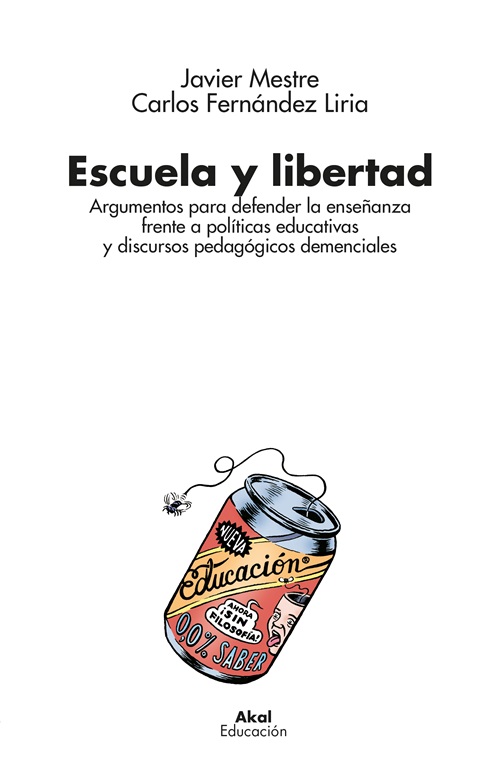- Books
- 4 de June de 2024
- No Comment
- 8 minutes read
(School and Freedom)

Escuela y libertad (School and Freedom)


Education and the Zombie
In his Treatise on the Emendation of the Intellect (1677), Baruch Spinoza asserted that the most valid ideas were those that met two essential criteria: clarity and transmissibility. The book under review sets out to “defend education against insane educational policies and pedagogical discourses” using fluid and direct prose. It avoids the confusing, neo-scholastic baroqueness typical of proponents of pedagogism, who are intent on reviving the living dead concept of competency-based reforms—a notion now only upheld by a handful of organic intellectuals entrenched in the most lamentable absurdity. The authors illustrate this with a polemical style that adeptly combines rigour with irony.
The competency-based Frankenstein no longer responds even to the wildest electric sparks, as evidenced by real-life examples presented by the authors. These examples come from a right-wing faction eager to dehumanise public education and a socially liberal left that facilitates the work of privatisers and various parasites. The book opens with the account of the day when Swedish pedagogue Jonas Linderoth confessed that “the reformist ideas of the 1990s used the framework of pedagogy with the secret aim of reducing educational expenditure” and revealed “how an economic agenda was disguised as pedagogy” (p. 8). In our country, there remain too many naive individuals who have not yet seen the light. They continue to claim they are defending supposed humanitarian causes, while in reality, what is at stake is the enforced residualisation of the public network, transforming it into a social dumping ground for the population deemed superfluous by our governments and economic structuring bodies.
Mestre, in his extensive argumentative text (with Fernández Liria’s epilogue being more of an autobiographical plea), speaks clearly and leaves no room for ambiguities: “Can we today consider the latest (and umpteenth) pre-university education reform, imposed by the PSOE, as genuinely progressive? On what parameters should a progressive stance be based—left-wing, if you prefer—when we talk about education? The hasty and forced implementation of the LOMLOE1 in Spain aligns closely with Linderoth’s warning and the prior experience of the Bologna Plan. The new law elevates a pedagogical hodgepodge that merges central elements of so-called alternative pedagogies with the trend sponsored by American billionaires known as ‘Universal Design for Learning’ (UDL) and the growing corporate consensus—from the neoliberal and economistic OECD—on shifting the focus from knowledge to competencies” (p. 9). These liquidationist mantras, accompanied by the usual campaigns of discredit and criminalisation, have been heard by Fernández Liria since the 1970s.
The novelty of the book lies in the collection of embarrassing absurdities presented by the two authors, demonstrating how a demented ideology that emerged fifty years ago has served to destroy the foundations of the enlightened school that democracy needs to uphold to maintain its basic social values. One by one, they deconstruct the main tenets of current pedagogism to show how they are serving to erode democratic coexistence: Competency-Based Education, bureaucratisation, delirious assessment decrees, digital dementia, and the conversion of instruction into a hyperactive and nonsensical marketplace—sustained only by the daily heroism of teachers, whom the authorities continually insult and humiliate through the country’s main media outlets.
The central idea of this essay is as follows: a left-wing educational policy does not impose a supposed left-wing school but instead generously supports and protects a robust public school system in a country that explicitly prohibits the segregating grant-maintained schools’ circuit. Amid the usual uproar of pedagogical witchcraft, the core issue sometimes remains unclear: PP and PSOE3 (and other regional political formations) are dedicated to safeguarding segregation to create a stratified society immersed in economic absolutism. All the rhetoric of lomloist pedagogism is nothing more than a distraction screen intended to whitewash an unstoppable process of cultural liquidation and accelerated budget cuts. We have reached a point where words have lost their usual meaning, and pedagogical jargon has assigned them an oblique and manipulated sense. When they talk about “freedom,” we must understand “segregation,” and where “inclusion” is mentioned, what is actually promoted is “austericide”2.
Therefore, if this book serves any purpose, it is to bring the educational controversy out of the delusions that usually blur reality, presenting the current situation without stridency but with some forcefulness, presided over by the pedagogical Newspeak, completely “simplistic and populist”.
It is essential to read School and Freedom to realise the surreal extreme to which our country has gone in its effort to transform a school for citizen emancipation into a factory generating inequality and labour cannon fodder devoid of human dignity. The reader leaves the book bewildered by the nonsense just presented with a commendable order and serenity. Unfortunately, the diagnosis, in the absence of a rational and responsible left determined to defend the values of the democratic school, cannot be optimistic: “The classroom will eventually become a warehouse of particularities, lacking the essential element for learning, which is the silence of individuals, allowing concepts, the ideas that enable us to think rationally about the world, to speak within them. Each will remain with their computer and software adapted and tuned to their personal tastes, as advocated by UDL, and the class will be an extension of the ego bubble fostered by the experience with electronic devices connected to social networks and internet feed services”. Our leaders have repeated it ad nauseam: there is nothing to learn; what must be promoted is the gymnastics of resilience that allows the future employee to survive amidst economic earthquakes, without space for reflection, free leisure, structured knowledge, rational pause, interpersonal communication, concentrated reading, deep study, informed debate, and the knowledge of cultures and universal values, replaced by the Digital Standard and obedience to the Automaton.
___
1 LOMLOE stands for “Organic Law for the Modification of the Organic Law of Education.”
2 The neologism “austericide” combines “austerity” and “homicide”
3 Popular Party and Socialist Party
Title: Escuela y libertad. Argumentos para defender la enseñanza frente a políticas educativas y discursos pedagógicos demenciales
Authors: Javier Mestre and Carlos Fernández Liria
ISBN: 978-84-460-5523-5
Publisher: Akal
Language: Spanish
Number of pages: 171
Publication date: 2024
Source: educational EVIDENCE
Rights: Creative Commons

